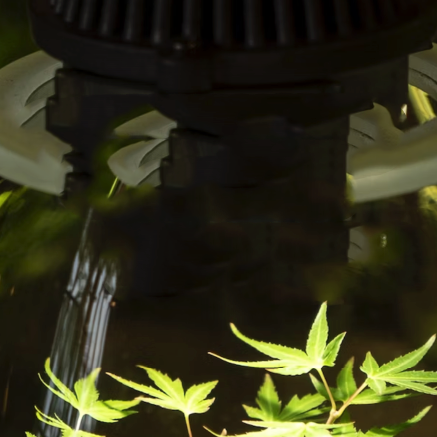Large numbers of growers are moving away from synthetic, mineral-based feeds and switching to organics. Organic nutrients have a lot to offer - they're quicker and easier to use (because you don't have to test EC levels), and they deliver an end-product that's hard to beat in terms of flavours and aromas. There's just something about organically grown produce that makes it tastier, jucier and more satisfying.
Conventional wisdom suggests that the trade-off between mineral and organic feeds is one of yield versus flavour: organic feeds offer quality and minerals deliver quantity. There is some truth to this, but with the latest generation of organic nutrients, huge yields are becoming easier and easier to achieve. You really can have the best of all worlds: simplicity, quality AND quantity. And there's no better way to do it than the new range from British Organic Bio. They've packed an array of potent organic ingredients into a small number of bottles. The whole line-up consists of just six nutrients and a pH adjuster, making life easier for the grower and saving even more time and effort when making up feeds. Judging from customer feedback, the results are hard to beat.
The base nutrients come in the form of Fish Base and Carbon Base. You'll need to use a combination of the two right the way through the grow and bloom phases. British Organic Bio have made life easy with a clear and concise feed chart that outlines exact dosages. Just go to the downloads section on one of the product pages and you'll find a copy of it. As a rough guide, you'll generally need to use bigger doses of Fish Base in the veg stages, going heavier on the Carbon Base in bloom.
Fish Base is produced using hydrolysed fish extracts derived from sustainable sources. It may not be vegan friendly, but your plants won't care about that - in fact, they'll go mad for it because it's teeming with macronutrients, micronutrients and amino acids. Carbon Base introduces beneficial microbes to the mix that perform a multitude of roles. At the same time, Carbon Base provides a source of material for microbes to feed on, boosting populations and allowing them to colonise the substrate.
Simply put, in organic growing, microbes are vital. Mineral feeds deliver nutrients straight to roots in the form of salts. Organic extracts, however, need to be 'unlocked' by microbes in order to make them available - no microbes, no nutrient uptake. One quick tip - tap water contains chlorine, which can kill microbes off before you've even started. You can get around this quickly and easily by adding a small dose of Neutralise before making up feeds. It will neutralise the chlorine and choloramine content instantly, making it safe for use.
Like fish base, carbon base is also jam-packed with nutrients. Rigorous testing has shown that it triggers huge spikes in root development, and as we all know by now, strong, robust root systems build bigger and better plants. This is one of the many factors that ensures that the British Organic Bio range can deliver yields on a par with top-tier hydroponic nutrients.
As mentioned previously, microbes are the main drivers behind organic nutrient uptake. Organic Microbes adds to the microbes delivered by Carbon Base, pushing things even further with three types of beneficial bacteria: Bacillus Methylotrophicus, Bacillus Subtilis and Bacillus Licheniformis.
These strains have been selected for their ability to produce dramatic effects. As they colonise the soil, they'll break down the organic extracts, making them available as feed, and at the same time, they'll also break down any other organic matter that happens to be lying around, like dead roots. Clearing out waste improves the quality of the soil and massively reduces the likelihood of encountering crop-threatening root diseases, like pythium.
Organic Boost squeezes extra perfromance out of plants during the bloom stages. Triacontanol, the main ingredient, is a phytohormone - a chemical signaller or 'growth factor'. Unlike synthetic PGRs that can often come with nasty side effects, triacontanol is derived from beeswax using a natural process. It's completely non-toxic but has incredible effects on plants. It works by boosting chlorophyll levels in leaves - the green pigment that's involved in the process of photosynthesis. Improved rates of photosynthesis allow plants to assimilate more CO2, causing fruits to swell up in size. Triacontanol also down-regulates stress factors while increasing cell growth and multiplication.
If you're not quite ready to move away from your existing organic nutrients, try adding Organic Boost to your current feeding schedule and wait for the results!
By now, you'll probably be familiar with silicon as an additive. Silicon strengthens up cell walls, and stronger individual cells build stronger overall plants. Sea Silica is one of those additives where the effects are easily noticeable after just a few doses.
You'll start to see much thicker stems and branches that can uptake more liquid and distribute it to the required areas. This speeds up overall growth rates, increasing stress resistance levels and laying the foundations for bigger and better crops. You'll see leaves looking greener and glossier, making them harder for pests to penetrate.
Sea Silica will naturally raise the pH of your nutrients, so it's useful to have around alongside British Organic Bio's pH Down, for those times when you need to make alterations to the pH (aiming for around 6.0).
There's also a Cal Mag option, which is handy for growers in soft water areas or for those running reverse osmosis systems.
And if you want to dip your toe in the water, take a look at the 'Try-It Box', which comes with base nutrients, Organic Boost and Organic Microbes.
Want to learn more about British Organic Bio Nutrients? Click here

